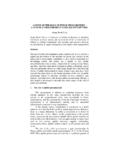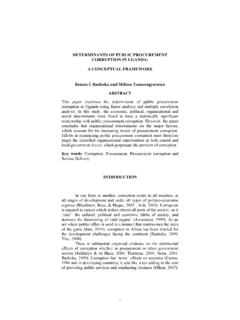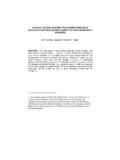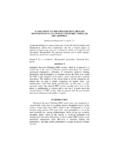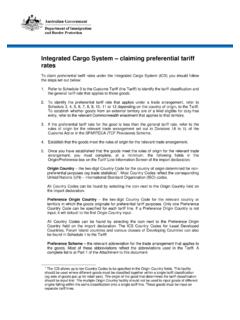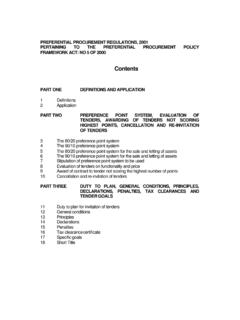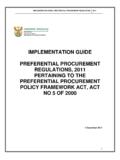Transcription of PREFERENTIAL PROCUREMENT - IPPC - About IPPC
1 PREFERENTIAL PROCUREMENT : A CASE SUDY OF SOUTH AFRICA John Derek Taylor and Kishore Raga John Derek Taylor, PhD., is a Senior Lecturer in the Department of Political & Governmental Studies, Nelson Mandela Metropolitan University, Port Elizabeth. His teaching and research interests are in developmental local government and project management. Kishore Raga, PhD., is Director of the School of Governmental & Social Sciences and Principal Lecturer in the Department of Political & Governmental Studies, Nelson Mandela Metropolitan University. His teaching and research interests are in public sector PROCUREMENT , public sector ethics and water conservation. ABSTRACT PREFERENTIAL PROCUREMENT also known as affirmative PROCUREMENT comprises participation programmes aimed at the engagement of Small Medium Micro Enterprises (SMMEs) owned by previously disadvantaged persons in all types of contracts and the generation of income for marginalised sectors of society.
2 Marginalised sectors refer to people who were discriminated against on the basis of race, gender, ethnicity and disability under the former apartheid regime (separate development based on race). The implementation of the PREFERENTIAL PROCUREMENT Policy Framework Act 5 of 2000, gives effect to section 217(3) of the Constitution of the Republic of South Africa of 1996, by providing a framework for the implementation of a fair public PREFERENTIAL PROCUREMENT policy. The South African government identified the above PROCUREMENT policy as part of the overall public sector PROCUREMENT reform initiative, as critical to the economic empowerment of those sectors of the country s population who were previously excluded from mainstream economic activities.
3 PREFERENTIAL PROCUREMENT endeavours to ensure that public funds are expended in such a way that all segments of the South African population benefit from such expenditure through job creation and commercial activity. 2In this paper, the purpose for the formulation of the PREFERENTIAL PROCUREMENT policy will be discussed. The Draft PREFERENTIAL PROCUREMENT Regulations of 2009 are also reviewed. The article concludes with a number of recommendations. INTRODUCTION It can be argued that the primary aim of the South African government's PROCUREMENT policy is to redress past imbalances created under the former policy of separate development (apartheid) by favouring historically disadvantaged people in the awarding of state tenders.
4 Specific terms have been used to define those who are seen as having been disadvantaged in the past. Such terms include: PDI or HDI (previously or historically disadvantaged individual), ABE (affirmable business enterprise), APSP (affirmative professional services provider). Primarily, preference is to be given to disadvantaged people in terms of race, gender and disability. The commencement of South Africa's PROCUREMENT policy was the publication of the "10-point Plan" by the Department of Public Works in November 1995. The Constitution of the Republic of South Africa Act 108 of 1996 features a built-in clause (section 217) which enables state departments to design tender adjudication criteria to fulfil particular social goals.
5 During April 1997, the Green Paper on Public Sector PROCUREMENT Reform in South Africa saw the light, but this document is vague and merely proposes principles that should be followed for good governance. The PREFERENTIAL PROCUREMENT Policy Framework Act 5 of 2000 and the PREFERENTIAL PROCUREMENT Regulations, 2001 set out how the policy is to be implemented. The regulations define what is meant by a "Historically Disadvantaged Individual", and allows a maximum of 10% of the tender adjudication criteria to be allocated for HDI status when the contract is over R500 000 in value. For contracts of under R500 000 in value, a maximum of 20% may be allocated for social goals. It was decided by Cabinet that a preference mechanism must be introduced in the PROCUREMENT of all goods and services to target especially those individuals discriminated against under the previous political dispensation.
6 For this purpose, the presumption is made that South African citizens who fall into population groups that had no franchise in national elections to the introduction of the 1983 and 1993 Constitutions, are Previously Disadvantaged Individuals (hereinafter, PDIs). It is incumbent on individuals to demonstrate their claims to fall into such population groups on the basis of identification and association (Provincial Tender Board: User Manual, 2000:67). A brief historical overview of PREFERENTIAL PROCUREMENT in South Africa follows. HISTORICAL OVERVIEW OF PREFERENTIAL PROCUREMENT IN SOUTH AFRICA Nano (2008:1) states that the previous PROCUREMENT approach had various fallacies. There was, for example, limited accountability, transparency and no fair equitable distribution of economic resources.
7 Furthermore, there were no supporting structures to oversee the process. Against this background, the government realised the need to have an integrated approach towards the acquisition of public goods and services (Nano, 2008:1). The idea was for the public service to operate in an environment where there is fairness, equity, transparency, competition and value for money. In terms of the Green Paper on Public Sector PROCUREMENT Reform in South Africa (Government Gazette No. 17928, 14 April 1997:33), a system of Affirmative PROCUREMENT was advocated. This green paper was a discussion document which contained proposals aimed at achieving the objectives of good governance, developing and utilising the country s human resources potential to the full and encouraging a well-developed and competitive business sector (Nano, 2008:2).
8 Taken further, the PREFERENTIAL PROCUREMENT policy was advocated to enact the vision for the PROCUREMENT reform process and to facilitate purposefully the flow of commerce to and through to those population segments who had been historically under-utilised and excluded from participation. Watermeyer (2000) argues that this would be done in such a manner that participation in PROCUREMENT activities would be ensured through making the tender process accessible to specific groups without guaranteeing work, link the flow of money into targeted business enterprises (a system of PROCUREMENT which is aimed at providing employment and business opportunities for disadvantaged / marginalised communities referred to as target groups ) with a concomitant flow of responsibility, increase the volume of work available to the poor and marginalised sectors of society and provide employment and income generation opportunities for marginalised sectors of society in all types of contracts, for example, building and construction (Government Gazette No.)
9 17928, 14 April 1997:33). In terms of prescriptions contained in the above-mentioned Government Gazette, (No. 17928, 14 April 1997:49), it was envisaged that PREFERENTIAL PROCUREMENT would, in the long term, facilitate growth in terms of the efficiency and effectiveness of service delivery as well as the numbers and sizes of business enterprises owned and controlled by previously disadvantaged individuals. Furthermore, emerging enterprises were to contribute to the tax base, engage workers who are affiliated to labour organisations, adhere to safety and environmental regulations and, in their business activities reflect norms and standards prevalent in developed countries.
10 The above-mentioned proposals as discussed in the Green Paper on public sector PROCUREMENT in relation to the previously disadvantaged individuals, resulted in the implementation of the PREFERENTIAL PROCUREMENT Policy Framework Act 5 of 2000, whereby the latter Act gives effect to section 217(3) of the Constitution by providing a framework for the implementation of the PROCUREMENT policy contemplated in section 217(2) of the Constitution. In terms of section 217(3) of the Constitution, national legislation must prescribe a framework within which the PROCUREMENT policy may be implemented. However, in terms of an amendment to section 217 of the Constitution, the discretionary power of may has been amended to must which now places an obligation on government.

